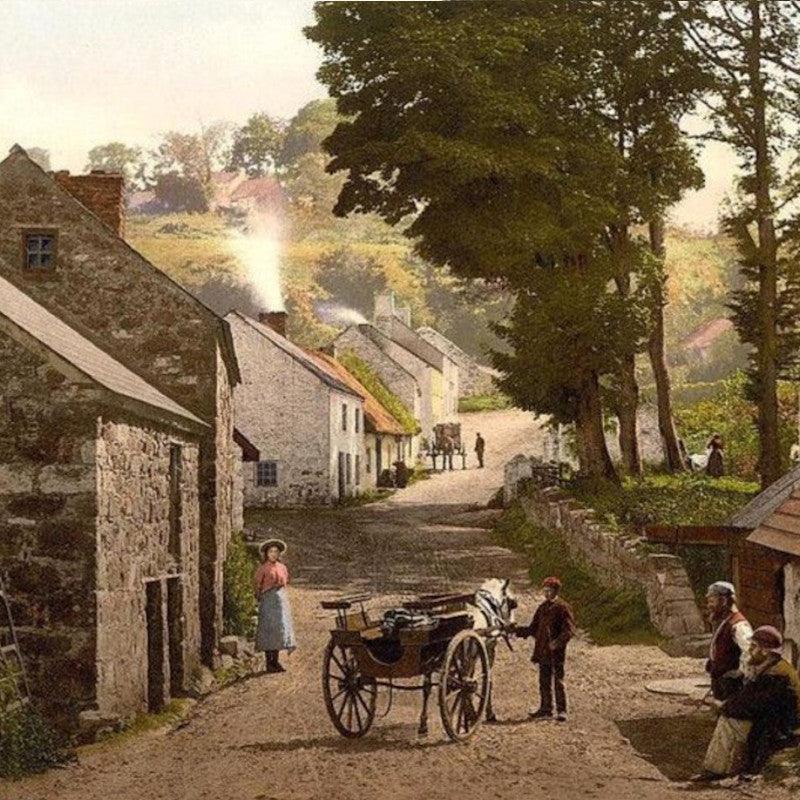Gretna Green's Proud History of Scandal
Las Vegas may be the marriage capital of the U.S, but with all due respect to that little desert gem, its reputation as wedding central is often overshadowed by its other famous attractions, namely the eye-popping kitsch and 24-hour a day casinos that lure thick-knuckled card sharks and gambling grandmas in gold lame. But far across the ocean, nestled on the border between England and Scotland sits a true marriage town, a little place called Gretna Green that has been synonymous with clandestine weddings - and therefore romance - for more than two hundred and fifty years. 
Gretna Green would have remained a sleepy little hamlet if only England hadn't passed a law in 1754 requiring all marriages be recognized by the church and that couples under 21 have parental consent. Scotland was more liberal at the time; couples as young as sixteen could marry freely simply by having their marriage proclaimed in front of two witnesses, no clergy needed at all. This caused a veritable stampede of anxious young lovers, spurring on their horses only as far as the first town across the Scottish border, where they could marry safely and consummate their unions with a clear conscience.
While today we consider an elopement a romantic thing, in those days an elopement brought disgrace and shame to the entire family of the couple involved, and often extreme measures were taken to "rescue" daughters who had been abducted by fortune hunters or ne'er-do-wells - because no respectable, God-fearing man would do such a thing, most parents believed, not matter how much he claimed to love her. A legal marriage was of no consequence if it wasn't blessed - or perhaps just seen to be blessed - by an ordained minister and was indeed considered barely a marriage at all. Fathers set out with pistols and grim determination to kill the blackguard who had nabbed his daughter, or else be killed defending her honour. And sometimes, these angry fathers had every right to be angry. 
The road to Gretna was plagued with heartbroken and abandoned young women who had been promised marriage, carried off towards Scotland, seduced in one of the inns along the way and then abandoned the next morning to find their own way home if their families would accept them back. Even if the young man's intentions were honourable and a marriage did take place, the couple still suffered under the scorn and ridicule of having done such a scandalous thing.
This was a time when the most privacy a proper unmarried couple could ever hope for was a moment or two alone in one corner of a crowded room, when young women were not allowed to travel out of doors without a chaperone, and when the thought of what might take place within the confines of an unsupervised, bumpy carriage to Scotland made many old dowagers swoon away with shock - not to mention the added insult that these "marriages" were conducted not by respected vicars of the Anglican church but by some grimy old blacksmith who banged something with a hammer and pronounced them man and wife.
But there were many happy unions there too, so many that Gretna's reputation as a lovers' haven became so well known that the Houston family, who owned the original blacksmith shop, opened up their premises as a tourist attraction in 1886. Attitudes and prejudices eased and the romance of elopements began to warm the hearts of the once prudish Victorians.
Elopements and planned anvil weddings continued in Gretna Green right up until 1940 when a law was passed outlawing "anvil priests" and requiring all marriages be conducted by a clergyman or a registrar. This appeared to be the end of Gretna Green. Then, in the 1970's, new interest in the town's history (and a new registrar's office complete with luxurious wedding suites) revitalized the town as a tourist attraction. It got a further boost in 1995 when English law finally changed and allowed couples to be married in places other than a church or a registry office for the first time since 1837.
This, along with that fact that some British soap operas included hasty elopements to Gretna in their storylines, inspired many English couples to search out alternative locales for their marriages, and soon Gretna became popular once again. Popular, perhaps, isn't the word. Weddings are Gretna's only real industry, with more than half the store fronts on the main street housing photographers, formal wear, hairdressers and bagpipers-for-hire. This town of only 3000 residents witnessed nearly 5000 weddings in 2000, at a rate of 23 a day in August alone. Couples line up patiently outside the original blacksmith shop, or the recreated one near by, stepping aside after their nuptuals to let the couple behind them have their turn, all in the presence of curious on lookers. They show up in kilts and motorcycle leathers, jeans and formal attire, and while most opt for a more private ceremony at the nearby registry office, there are enough public, tourist-attraction anvil weddings to make Gretna Green the second most popular tourist destination in Scotland, drawing 700 000 tourists a year. Only Edinburgh Castle draws more.
 Why all this fuss? some people might wonder. Haven't we all seen and heard enough wedding hype to last a lifetime? Isn't the Gretna Green website itself merely an example of how wedding crazy some people - some towns - have become? In this case, the answer is no. Despite outward appearances, Gretna Green is not now about weddings anymore than it ever was ; then, as now, it was about marriage. It was a place that offered the only real alternative to couples who wanted to be together and forego the formal, stuffy, grandiose weddings and the narrow minded marriage customs that existed for hundreds of years, and it had to survive generations of disrespect and disapproval to do so. It had to sit there, quietly snuggled on the English border, and wait for the world to catch up to it. The fact that the world has, in droves, doesn't detract from the charm and the simplicity of this little place, where hearts and minds were forged together and society was told, in no uncertain terms, to get lost. "Gone to Scotland" used to be a epithet, a phrase that carried more meaning than those three little words implied. Now it means just the opposite, as it should have all along.
Why all this fuss? some people might wonder. Haven't we all seen and heard enough wedding hype to last a lifetime? Isn't the Gretna Green website itself merely an example of how wedding crazy some people - some towns - have become? In this case, the answer is no. Despite outward appearances, Gretna Green is not now about weddings anymore than it ever was ; then, as now, it was about marriage. It was a place that offered the only real alternative to couples who wanted to be together and forego the formal, stuffy, grandiose weddings and the narrow minded marriage customs that existed for hundreds of years, and it had to survive generations of disrespect and disapproval to do so. It had to sit there, quietly snuggled on the English border, and wait for the world to catch up to it. The fact that the world has, in droves, doesn't detract from the charm and the simplicity of this little place, where hearts and minds were forged together and society was told, in no uncertain terms, to get lost. "Gone to Scotland" used to be a epithet, a phrase that carried more meaning than those three little words implied. Now it means just the opposite, as it should have all along.
Leanne Bell lives in Canada with her husband, who, along with the works of Jane Austen, was her main inspiration in writing about how to make a fairy tale marriage come true. You can learn more about her work on her site, www.andtheylivedhappilyeverafter.com.
Enjoyed this article? If you don't want to miss a beat when it comes to Jane Austen, make sure you are signed up to the Jane Austen newsletter for exclusive updates and discounts from our Online Gift Shop.



Leave a comment
This site is protected by hCaptcha and the hCaptcha Privacy Policy and Terms of Service apply.